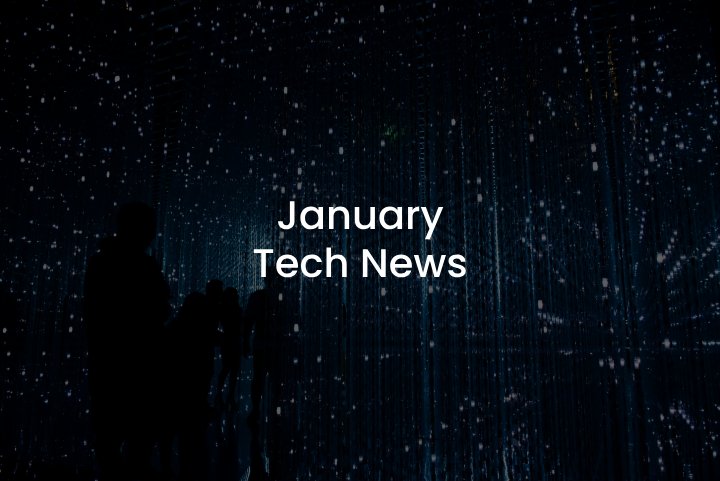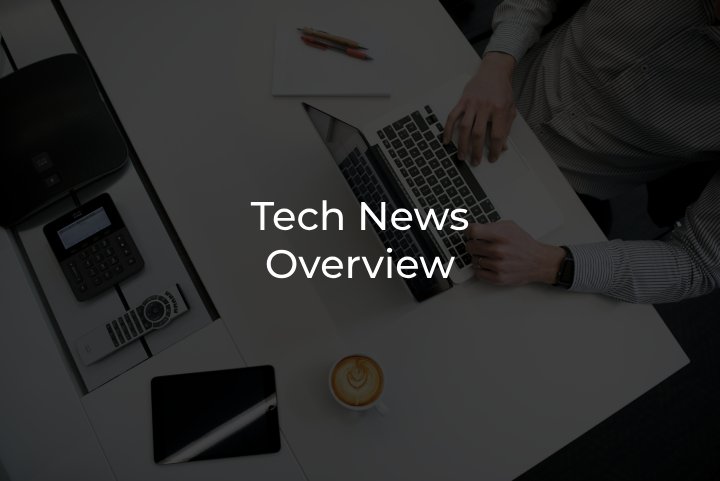
Tech Trends Unveiled: January’s Top Innovations
The continuous flow of new software, innovative concepts, and cutting-edge artificial intelligence and machine learning solutions is becoming more common worldwide. We’ve moved seamlessly into February, a month filled with tech news and, accordingly, breakthrough ideas and valuable achievements.
Our agenda will include the following:
- Dewave AI system turns thoughts into text;
- Novel AI-based updates of Google Lens and Samsung;
- Upgrades failed to install on Windows 11;
- Stellantis bought CloudMade’s AI system;
- Surprising features of upcoming IOS 17.4 update;
- Japan’s spacecraft landed on the Moon;
- Communication and optimization drive advances in fleet and boat software.
Let’s discover the latest technology news.
DeWave Innovative AI System Turns Thoughts into Text
Australian researchers developed an AI-based system called DeWave for paralyzed people. The goal was to help people who could not speak or write on a computer, and the accuracy of the first experiments reached more than 40%. The technology allows converting thoughts to text by recording brain activity and eye movements through the electroencephalogram (EEG). DeWave learns to decode thoughts by correlating EEG signals to ocular fixations that indicate recognized words.
It is the first technology that does not require implants or surgery. Integration with huge language models brings up new possibilities in neuroscience and AI. The technique, which needs a tight EEG cap to collect the incoming signal, might one day allow paralyzed individuals to communicate freely or operate assistance gadgets directly. However, considerable effort must be made to increase the system’s accuracy to a 90% or higher speech recognition rate.
Novel AI-Based Updates of Google Lens and Samsung
Google Lens’s new feature allows simplified and broad search queries using the image. AI-powered multi-search technology recognizes the image and enhances quality search by adding complicated modifications. You can attach the picture and ask simultaneous questions, and then Google provides detailed instructions. Moreover, AI is used in processing text queries and the correct summarization of data found on the internet. In the United States, users may access upgraded Google Lens; however, if you are not located in the US, enroll in the Search Generative Experience (SGE) trial to test out the improved features.
Moreover, Samsung and Google have introduced a new function called Circle to Search. The feature allows users to circle or write on any item shown on the screen to initiate a search on Google. This tool enhances the ease of visually searching for information on the internet.
Upgrades Failed to Install on Windows 11
The latest cumulative update of Windows 11, KB5034123, is experiencing installation problems. A clear explanation for the installation troubles and audio errors exacerbates the situation. Some users have reported a reoccurring issue in which the update begins to download and reaches a specific point (usually 25%). Then, the Windows update shows a failure notice, forcing a retry of those results in the same issue.
Unfortunately, solutions to these problems weren’t provided, and it was recommended to wait for Microsoft’s answer before turning to dangerous options. The installation issues were initially intermittent but have grown more prevalent, raising expectations for Microsoft’s response.

Stellantis Bought CloudMade’s AI System
Stellantis N.V., an automotive manufacturing business, has acquired CloudMade’s artificial intelligence platform, machine learning models, and intellectual property to enhance its Dare Forward 2030 software strategy. The AI-powered framework will support the development of STLA’s SmartCockpit, providing personalized and predictive functions for vehicles and mobile applications. The deal includes CloudMade technology, intellectual property, 44 engineers, and software developers.
The project aims to accelerate the development of end-to-end navigation functions, improve data privacy, and introduce kits for developing customized models. Applying such solutions helps create intelligent mobility solutions, providing personalized driving experiences, predictive maintenance, advanced navigation, and targeted functions for fleet management.
Surprising Features of Upcoming iOS 17.4 Update
The upcoming iOS 17.4 update, scheduled for early March, will bring significant changes to the iPhone, especially for users in the EU. These changes, responding to the Digital Marketplace Act, include:
- allowing rival app marketplaces;
- adjusting Apple’s commission fees to app developers;
- altering the default web browser on iPhones.
Apple’s proposed changes, which will initially affect the EU, could have a global implication, affecting the company’s revenue, security, and privacy. While Apple is introducing anti-malware tools and warnings to increase openness, this could lead to lower revenues and developers facing new fees. The goal is to make the iPhone more customizable, but critics like Spotify’s CEO have called the proposal extortionate. The defense changes emphasize the choice for developers, but corners have been raised about the inequality between iPhones and iPads in the EU. The situation is causing polarized reactions as the update is approaching.
Japan’s Spacecraft Landed on the Moon
Japan’s SLIM spacecraft landed on the Moon, marking the first lunar landing in Japanese history. However, the mission encountered a problem as the spacecraft’s solar panels, designed to generate power for scientific instruments, were not functioning. The spacecraft is currently running on batteries with a limited service life. The Japan Aerospace Exploration Agency (JAXA) is working to collect data before the batteries run out.
The Smart Lunar Exploration Lander (SLIM) mission was intended to land near the Shioli crater on the lunar nearside. Despite the problem with the solar panels, JAXA considers the mission a success and is assessing the spacecraft’s condition for further steps, leaving the possibility of solar panels functioning if their angles align with the sun’s changing position.

Communication and Optimization Drives Advances in Fleet and Unmanned Boat Software
Finally, it’s the last point but full of many inventions from different companies, such as Overseas Shipholding Group, Amazon, Damen Group, Anthony Veder Group, and Kuwait Oil Tanker Co.
- 1. The tanker group Overseas Shipholding Group (OSG) has equipped its vessels with Elon Musk’s SpaceX Starlink satellite internet services to provide faster connectivity for crews and enable high-speed internet access in remote maritime locations.
- 2. Amazon successfully tested laser links between prototype satellites for its Project Kuiper LEO constellation, achieving data communication speeds of 100 Gbps over nearly 1,000 km. The company plans to include operational optical inter-satellite links (OISLs) on its first commercial satellites, enhancing communication for maritime applications.
- 3. Damen Group is exploring autonomous solutions from Zeabuz for maritime applications. The collaboration aims to scale up technology for autonomous vessel operations, enhance safety, optimize asset effectiveness, and create new business models in the maritime sector.
- 4. Anthony Veder, a gas shipping business, has chosen RadiantFleet to provide crewing and payroll software for its fleet. This will include implementing Radiant Crewing, Radiant Crew Portal, and Radiant Payroll to streamline the management of crew information and payments for daily crewing operations.
- 5. Kuwait Oil Tanker Co (KOTC) will implement MariApps Marine Solutions’s smartPAL software on its shipping fleet, including modules for vessel performance monitoring, digital logs, electronic oil record books, and smartOPS software to optimize operations.
We have provided you with the latest tech news in the tech and science industries. Feel free to contact Agiliway with any questions you might have.


